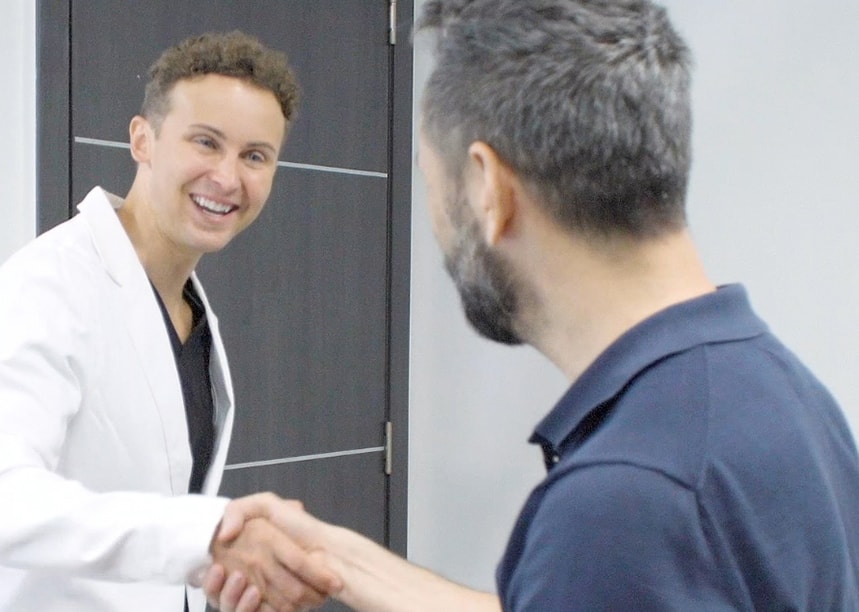NJ Sciatica Specialist Reveals 4 Tips for Choosing a Mattress When Dealing with Back Pain
May 31, 2021
Deciding what the best type of mattress is when you are suffering from back pain can be a challenge especially because the debate is still ongoing. In most cases, it highly depends on the type of condition you are dealing with, as well as your unique needs.
So far, research points out that a medium-firm mattress may be the best choice for a night of pain-free sleep. These mattresses are shown to provide the best type of comfort and spinal support. However, there is no one-size-fits-all solution to choosing a mattress that allows a comfortable sleep.
Dr George Hanna, a renowned sciatic specialist argues there are more aspects to take into consideration rather than just the firmness of the mattress, as this is not the only thing that influences how well-rested we are. Read on to find out more about this controversial topic.

If you are dealing with back pain that keeps you up during the night, this is a sign you need to contact a pain management specialist as soon as possible. Only a specialist in interventional pain will be able to determine the cause of the pain and come up with accurate treatment plans for your herniated discs, joint issues, or bone pain. We recommend scheduling an appointment with a sciatica specialist near you, in NJ to prevent your pain from worsening.
Your condition determines the type of support you need
According to our sciatica treatment specialist Dr George Hanna, choosing the right mattress for your spinal condition is about more than just its firmness. It is worth discussing your medical history with your doctor, so that you may personalize your mattress to your specific requirements.
Before purchasing a mattress, make sure to pinpoint the following aspects: the type of condition that you have, the type of physical activities you are allowed to make, and the type of physical effort you should keep away from.

Knowing the things above makes a significant difference. Those who suffer from spinal stenosis, for example, will notice discomfort when standing or walking, but not when lying down. As a result, mattress firmness is not a major deciding factor and they are free to choose whichever mattress they find more comfortable.
People that have been diagnosed with spinal arthritis or disc conditions, however, need to be very careful about their mattress choice. They may benefit from more support, so a firmer mattress is often recommended.
Our doctors point out that, while it is true that we all need some sort of mattress support, people who have undergone spine surgeries may actually require less. Because the tissues may be stiffer, a softer mattress may provide more comfort.
If your mattress is too old, it’s time for a change
Age is of the matter when it comes to mattresses, especially because mattress springs degrade with time, resulting in a softer bed. If you suffer from certain back conditions this might worsen them. Take this into consideration when deciding whether to change your mattress or keep the current one.
While it is certain this may differ from person to person, there are studies that point out switching to a new mattress may improve back condition. Based on study results, which measured the quality of sleep and comfort of patients with back pain, participants have shown great improvement in pain levels after switching to a new mattress. The quality of their sleep improved significantly as well.
Your sleeping position matters as well
Your sleeping position can also influence the type of support you need, so it is worth discussing it with your back doctor on your first appointment. Below are some recommendations our doctors have made based on the preferred sleep position:
- Sleeping on the side: if this is your preferred sleep position, as it is for the majority of people, you may be putting a lot of strain on your shoulders and hips. In this case, you should be looking for a softer mattress, to provide more comfort.
- Sleeping on your stomach: for stomach sleepers, soft mattresses may hurt their back, as they will sink into the mattress with their stomach, arching their back and putting pressure on the lumbar area. A medium-firm mattress is the better option here, as it provides more support.
- Sleeping on your back: if sleeping on the back is your go-to choice, you need more support than the one you get from a medium-firm mattress. For increased support, try sleeping with a pillow under your knees and one under your lower back.
Additional factors that should be considered when choosing a mattress
Besides your medical condition and sleeping position, there are other external factors that can influence how much mattress firmness you need.
Your body weight is one of the factors that influence the firmness and support you require from your mattress. While there are no hard rules concerning which body types should sleep on a particular mattress, there are some general things to keep in mind. If you weigh under 200 pounds, a medium-firm mattress does seem to provide enough support, but if you weigh over 200 pounds, a firmer mattress may be more recommended, as it prevents you from sinking.
If you sleep with a partner, their movement during the night may impact the way you sleep and vice versa. It will benefit both if you chose a mattress that isolates movements and does not transfer them.
We value our patients, so, besides providing medical treatment such as steroid injections or sciatica treatment, we often happen to recommend lifestyle changes that may help improve their condition. This is part of a continuous treatment style that helps improve patients’ quality of life and decrease pain. If you are looking for a sciatica doctor, don’t hesitate to contact Pain Treatment Specialists and schedule an appointment today. Our doctors are ready to help you in one of their offices in Point Pleasant NJ, Paramus NJ, or Middletown NJ.
You can find us in Paramus on Route 17, near the Paramus Park Mall, in Clifton, NJ, on Route 46 E, past the Ford dealership, in West Orange, near the Essex Country Club, and in Woodland Park, on McBride Avenue.
Book a Consultation
Scheduling a consultation with one of our pain treatment specialists is one of the best ways to determine the proper solution for pain relief.
Meet Our Team of Back Pain Specialists
All of our Pain Doctors in New Jersey are Harvard Trained and Board Certified in Pain Management

Back Pain Doctor Clifton & West Orange NJ
Dr. George Hanna
Dr. Hanna is a Harvard Trained back specialist in New Jersey and New York. He serves as Medical Director of Pain Management.

Back Pain Doctor Clifton & West Orange NJ
Dr. Laura Lombardi
Dr. Lombardi is a Harvard Trained back pain treatment doctor, currently seeing patients in Clifton and West Orange, New Jersey.

Back Pain Doctor Clifton & West Orange NJ
Dr. Shane Volney
Dr. Volney is a Harvard Trained back treatment doctor seeing patients in the NJ areas of Clifton & West Orange, and in NYC.

Back Pain Doctor Clifton & West Orange NJ
Dr. Michael Nguyen
Dr. Nguyen is Harvard Trained and Board Certified in Pain Management. His pain center accepts major medical insurances and Medicare.

Dr. George Hanna

Dr. Laura Lombardi
Dr. Lombardi is a Harvard Trained back pain treatment doctor, currently seeing patients in Clifton and West Orange, and Paramus New Jersey.

Dr. Shane Volney
Dr. Volney is a Harvard Trained back treatment doctor seeing patients in the NJ areas of Clifton & West Orange, and in NYC.

Dr. Michael Nguyen
Dr. Nguyen is Harvard Trained and Board Certified in Pain Management. His pain center accepts major medical insurances and Medicare.
